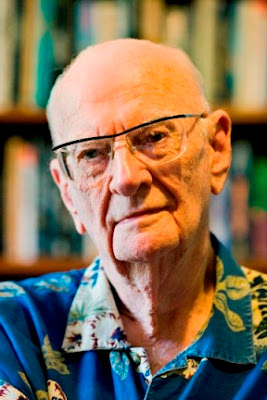All the dust has settled from the first week of NCAA Men's Basketball "March Madness". Lots of surprises... but Michigan State and UCLA are still standing as members of the 'sweet sixteen'.
Here's how my picks have panned out (click to get a better view) in my March Madness brackets:
Remember... Life's journey is not to arrive at the grave safely in a well preserved body- but rather to skid in sideways, totally worn out, shouting "holy s***...what a ride!" ----->Don't let your tombstone read: Died at 30- Buried at 80.
Sunday, March 23, 2008
Tuesday, March 18, 2008
Author Clarke Dead at 90
 Sir Arthur C. Clarke
Sir Arthur C. ClarkeBorn in Somerset, he came to fame in 1968 when a short story The Sentinel was made into the film 2001: A Space Odyssey by director Stanley Kubrick.
Once called "the first dweller in the electronic cottage", his vision of future space travel and computing captured the popular imagination.
An aide said he died at 0130 local time after a cardio-respiratory attack.
RIP Mr. Clarke- you will be missed.
Your novels inspired me and fostered both my love of reading and writing. I especially liked Rendezvous With Rama, Imperial Earth, Islands in the Sky and (of course) 2001: A Space Odyssey.
Wednesday, March 12, 2008
is blogging R-E-A-L-L-Y writing?
Question.
For someone who wants to write everyday, is blogging considered writing?
I mean, are my sometimes mindless, sometimes witty words that are placed on the web considered serious writing? Friends of mine have put serious words into their blogs.... serious meaning they actually noveled (can/should 'novel' be used as a verb?- not according to spellcheck) into their blogs with mixed results. Putting down raw and unedited content can stimulate a writer to 'crank it out' and not worry about the minutia.
I personally tried it for a few entries a while back and initially enjoyed it. The idea of just letting the creative energy flow onto the screen was exhilarating. But as the 'little editor man' inside me screamed louder and louder- I relented and let him out. He began to sap my energy and writer's life force. Once I 'gave in' to him, I lost that drive to continue.
I've been able to silence the inner critic before... but only during NaNoWriMo. Even this blurb today has been checked over and re-written (hard to believe, huh?).
What do you readers think? Do you know of anyone who writes fiction and uses a blog as a media or tool for their work?
For someone who wants to write everyday, is blogging considered writing?
I mean, are my sometimes mindless, sometimes witty words that are placed on the web considered serious writing? Friends of mine have put serious words into their blogs.... serious meaning they actually noveled (can/should 'novel' be used as a verb?- not according to spellcheck) into their blogs with mixed results. Putting down raw and unedited content can stimulate a writer to 'crank it out' and not worry about the minutia.
I personally tried it for a few entries a while back and initially enjoyed it. The idea of just letting the creative energy flow onto the screen was exhilarating. But as the 'little editor man' inside me screamed louder and louder- I relented and let him out. He began to sap my energy and writer's life force. Once I 'gave in' to him, I lost that drive to continue.
I've been able to silence the inner critic before... but only during NaNoWriMo. Even this blurb today has been checked over and re-written (hard to believe, huh?).
What do you readers think? Do you know of anyone who writes fiction and uses a blog as a media or tool for their work?
Sunday, March 9, 2008
i-pod music reload hell
Saturday, March 8, 2008
Un-sung American Hero ... ?
 This is Aaron Copeland, the first world renowned American classical composer. Aaron Copland was born in Brooklyn, New York, of Lithuanian Jewish descent. Before emigrating to the United States, Copland's father had Anglicized his surname “Kaplan” to “Copland” while in Scotland. Throughout his childhood, Copland and his family lived above his parents' Brooklyn shop.
This is Aaron Copeland, the first world renowned American classical composer. Aaron Copland was born in Brooklyn, New York, of Lithuanian Jewish descent. Before emigrating to the United States, Copland's father had Anglicized his surname “Kaplan” to “Copland” while in Scotland. Throughout his childhood, Copland and his family lived above his parents' Brooklyn shop.At the age of fifteen he had already taken an interest in music and aspired to be a composer, even though his parents never encouraged him or directly exposed him to it. His musical education included time with Leopold Wolfsohn, Rubin Goldmark (who also taught George Gershwin), and Nadia Boulanger at the Fontainebleau School of Music in Paris from 1921 to 1924.
He was awarded a Guggenheim in Fellowship in 1925 and again in 1926. Fanfare for the Common Man, perhaps Copland's most famous work, scored for brass and percussion, was written in 1942 at the request of the conductor Eugene Goossens, conductor of the Cincinnati Symphony Orchestra. It would later be used to open many Democratic National Conventions. The fanfare was also used as the main theme of the fourth movement of Copland's Third Symphony, where it first appears in a quiet, pastoral manner, then in the brassier form of the original. The same year Copland wrote A Lincoln Portrait which became popular with a wider audience, leading to a strengthening in his association with American music.
He was commissioned to write a ballet, Appalachian Spring, which he later arranged as a popular orchestral suite. The commission for Appalachian Spring came from Martha Graham, who had requested of Copland merely "music for an American ballet". Copland titled the piece "Music for Martha", having no idea of how she would use it on stage. Graham created a ballet she called Appalachian Spring (from a poem by Hart Crane), which was an instant success, and the music acquired the same name.
Copland was amused and delighted later in life when people would come up to him and say: "You were so right - it sounds exactly like spring in the Appalachians", as he had no particular program in mind while writing the music. In honor of Copland's vast influence on American music, on December 15, 1970 he was awarded the prestigious University of Pennsylvania Glee Club Award of Merit[6]. Beginning in 1964, this award "established to bring a declaration of appreciation to an individual each year that has made a significant contribution to the world of music and helped to create a climate in which our talents may find valid expression." (from Wikipedia).
Subscribe to:
Posts (Atom)
